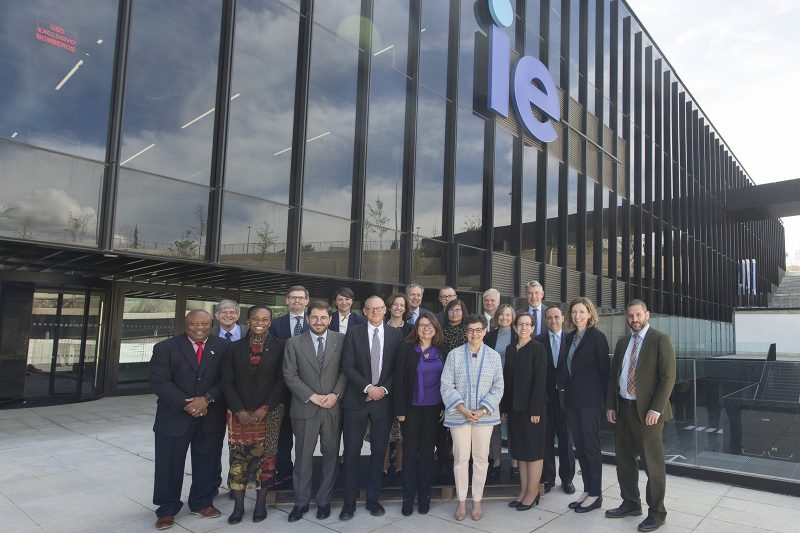The leaders of the most prestigious academic institutions in international relations discussed the challenges our world is facing and how schools of global and public affairs can help tackle them.
On April 23, the Association of Professional Schools of International Affairs (APSIA) annual deans’ meeting concluded after three days of open conversations between their deans and leadership teams. The meeting was hosted at the IE Tower, the new sustainable and technological vertical campus of IE University in Madrid. The IE School of Global and Public Affairs (IEGPA) is a member of APSIA’s executive committee and organized this year’s event.
The representatives of many prestigious universities from North America and Europe had a chance to meet face-to-face for the first time in person since 2020 and share their insights on what the future of international relations and the global order will look like, as well as to discuss how the world of academia should adapt to prepare the next generation of global leaders. Members and affiliates from Asia who could not attend in person due to the pandemic participated virtually.
“It is a privilege for IE School of Global and Public Affairs to host this meeting. We have been active members of APSIA for years and this is one way of giving back to the organization. Our world is changing very rapidly and is in dire need of effective training and impactful teaching on global affairs. This is what we aim to do at IE and an objective we share with APSIA colleagues.” said Manuel Muñiz, dean of IE School of Global and Public Affairs and Provost of IE University.
“On behalf of all the deans and directors of APSIA schools, I’d like to thank the IE School of Global and Public Affairs for hosting such a productive meeting. My colleagues and I so valued the opportunity to meet in person and I know all of us left the meeting with many new ideas about both how to better train the next generation as well as a deeper understanding of the challenges of the day. Being able to meet in Madrid was a special treat, for the city and its many splendors highlighted just what all of us have missed during the absence of international travel,” said APSIA President Jim Levinsohn, director of Yale University Jackson Institute for Global Affairs.
After two years of global pandemic and in the midst of the war in Ukraine, the deans agreed that the international system is changing rapidly before our eyes. The close-door conversations touched upon critical subjects that are disrupting the international arena and emerging challenges we are going to face, including the governance of emerging technologies, the emergence of antidemocratic movements across the globe or the peaceful accommodation of the rise of China, among many others.
The deans of the APSIA global alliance also reflected upon the recent evolutions of higher education and exchanged best practices on issues such as the increasing digitalization of the education space, mental health on campuses, ways to build a more diverse and inclusive faculty and student body and dealing with disrupting changes in the labour market, as illustrated by the great resignation phenomena affecting the United States.
One of the highlights of this annual meeting was a public event under the theme “Brave New World? The Future of International Relations following COVID-19 and the War in Ukraine.” The event featured an informal discussion between Levinsohn, Arancha González Laya, former Spanish Minister of Foreign Affairs and current Dean of Sciences Po Paris School of International Affairs, and IE University Provost and Dean of the IE School of Global and Public Affairs Manuel Muñiz.
During their visit to Spain, the deans also discussed these topics in an audience with His Royal Majesty King Felipe VI at the Zarzuela Palace in Madrid. King Felipe VI, who himself graduated from one of the APSIA member schools, exchanged opinions with the deans not only about the state of global affairs and the topics that will shape the global agenda, but also on the way academic institutions should adapt their pedagogy and content in order to stay at the forefront of knowledge production and professional training.
The deans also visited to de City Hall of Madrid, the Spanish Royal Academy, the Prado and Sorolla Museum and the city of Segovia (UNESCO World Heritage Site), where IE University has its historical campus.
“The city of Madrid and IE University provided a wonderful backdrop against which to consider the future of international affairs, as well as explore ever-better ways to prepare future generations for the many professions of international affairs,” concluded Carmen Iezzi Mezzera, executive director of APSIA.
APSIA is one of the world’s most important educational alliances, bringing together the leading graduate schools of international affairs and public policy. Currently, 38 schools from 10 different countries are full-members of APSIA, as well as an additional 29 affiliated universities from eight countries. IE School of Global and Public Affairs is one of the few European schools in the alliance and the only Spanish full-member.
